八年级英语下 unit 4
人教版八年级英语下册 Unit 4单元重点知识点总览
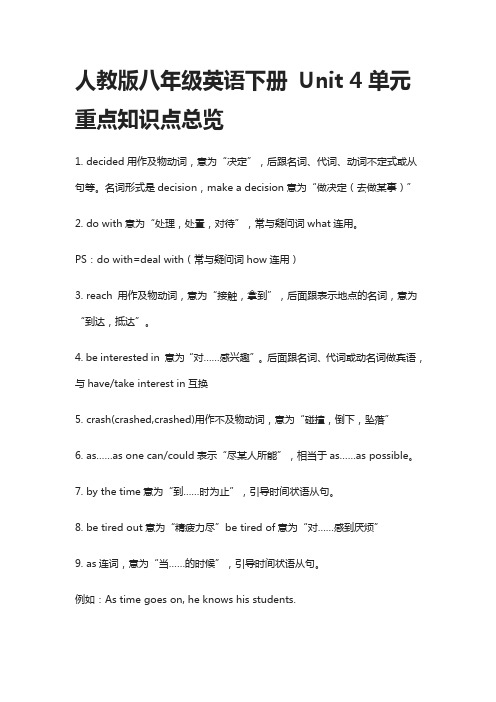
人教版八年级英语下册Unit 4单元重点知识点总览1. decided用作及物动词,意为“决定”,后跟名词、代词、动词不定式或从句等。
名词形式是decision,make a decision意为“做决定(去做某事)”2. do with意为“处理,处置,对待”,常与疑问词what连用。
PS:do with=deal with(常与疑问词how连用)3. reach 用作及物动词,意为“接触,拿到”,后面跟表示地点的名词,意为“到达,抵达”。
4. be interested in 意为“对……感兴趣”。
后面跟名词、代词或动名词做宾语,与have/take interest in互换5. crash(crashed,crashed)用作不及物动词,意为“碰撞,倒下,坠落”6. as……as one can/could表示“尽某人所能”,相当于as……as possible。
7. by the time意为“到……时为止”,引导时间状语从句。
8. be tired out意为“精疲力尽”be tired of意为“对……感到厌烦”9. as连词,意为“当……的时候”,引导时间状语从句。
例如:As time goes on, he knows his students.10. tie(tied,tied,tying)用作及物动词,意为“捆,绑,系”,tie…to…意为“把……系/捆到……上”。
be tired to是它的被动语态,意为“被捆到……上”11. until用作连词,意为“直到……为止”,在(某一特定的时间)之前,其主要用法有:与延续性动词连用时,表示“直到……”,动词用肯定形式,指主句的动作一直持续到until后的动作发生为止;not…until…意为“直到……才……”,主句动词通常为非延续性动词,指主句的动作一直到until后的动作发生时才发生。
12. the same size as…意为“和……一样尺寸,与……一样大小”。
新人教版八年级下册英语unit-4

Unit 4 Why don't you talk to your parents?一.基本知识点1。
Why don’t you talk to your parents? 你为什么不和你打父母谈谈呢?Why don’t you do sth ?= Why not do sth?为什么不..。
.。
.呢?2。
My parents don’t allow me to hang out with my friends. 我的父母不允许我和我的朋友们出去闲逛。
allow sb。
to do sth 允许某人做某事【拓展】allow v 允许allow doing sth 允许做某事They don’t allow smoking。
allow sb. to do sth 允许某人做某事My mother allows me to watch TV.be allowed to do sth 被允许做某事3。
What’s wrong? 怎么啦?【解析】What’s wrong( with sb。
/ sth) (某人/物) 怎么了?4。
look through 浏览5.work out 解决;成功地发展,后跟fine,well,badly等词,表明产生的结果如何.The teachers encourage their students to ____ the problems by themselves, and in this way students can enjoy success。
A。
give up B。
work out C. look through5。
get on with sb. 和某人和睦相处;和某人关系良好=get along withget on well/ badly with 相处的好/坏My problem is I can’t get on with my favorite. 我的问题是我不能喝我的家人和睦相处。
初中英语八年级下册Unit 4(含答案解析)

一、选择题1.I ________ believe it ________ I see it with my own eyes.A.won't;and B.won't;until C.will;but D.will;until B解析:B【解析】句意:直到我亲眼看见它,我才相信它。
not…until…“直到……才……”,表示直到某个时间,一动作才发生,汉语表达的是肯定意思,英语则用的否定句来表示,故选B。
2.When Peter learned I was interested in skating, he offered ______ me.A.to teaching B.teachingC.teach D.to teach D解析:D【详解】句意:当彼得得知我对滑冰感兴趣时,他主动提出教我。
考查动词形式辨析题。
offer to do sth. 主动提出做某事,固定短语;根据句意结构,可知选D。
3.If you compare him ______ other children of his own age, you’ll find he’s not very tall. A.for B.withC.at D.about B解析:B【详解】句意:如果你把他和他同龄的其他孩子相比,你会发现他并不高。
考查介词辨析。
for为了;with和;at在某处;about关于。
compare with(把……)与……相比,固定短语;根据句意结构,故选B。
4.He didn’t walk slowly ______ he was sure nobody was following him.A.and B.since C.until D.but C解析:C【解析】句意:他走得很慢,直到确信没有人在跟踪他。
考查连词辨析题。
A. and和,表并列;B. since由于,表原因;C. until直到……才,表时间;D. but但是,表转折。
人教版八年级英语下册Unit4全单元课件(共128张ppt)
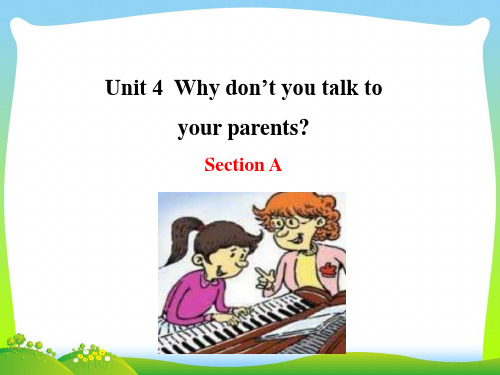
【用法辨析】“说”不同
及物动词, 常用于: tell sb. sth. =tell sth. to sb. 告诉 tell 某人某事
【归纳拓展】提出建议的句型
【活学活用】
①—Why don’t you
John a toy car for his birthday?
—Good idea! He is crazy about cars.
A. buy
B. buying
C. to buy
D. buys
②Why not go out for a rest? (改为同义句)
13、He who seize the right moment, is the right man.谁把握机遇,谁就心想事成。2021/7/212021/7/212021/7/212021/7/217/21/2021
14、谁要是自己还没有发展培养和教育好,他就不能发展培养和教育别人。2021年7月21日星期三2021/7/212021/7/212021/7/21
__c___ ___b__
3a Read the letters and complete the chart.
Problems
Advice
I can’t get on with my family.
talk about these feelings with your family
My parents fight a lot.
Unit 4 Why don’t you talk to your parents?
Section A
Lead in Look at these problems. Can you give some advice?
八年级英语下册知识讲义-重点单词(Unit 4 )-人教新目标

初中英语重点单词(下册Unit 4 Why don’t you talk to your parents?)知识梳理allow v. 允许;准许wrong adj. 错误的;不对的guess v. 猜测;估计deal n. 协议;交易relation n. 关系;联系;交往communication n. 交流;沟通argue v. 争吵;争论cloud n. 云;云朵elder adj. 年纪较长的instead adv. 代替;反而;却whatever pron. 任何;每一nervous adj. 焦虑的;担忧的offer v. 主动提出;自愿给予proper adj. 正确地;恰当地secondly adv. 第二;其次communicate v. 交流;沟通copy v. 复制;复印return v. 回来;回去member n. 成员;分子pressure n. 压力compete v. 竞争;对抗opinion n. 意见;想法;看法skill n. 技艺;技巧typical adj. 典型的football n. 足球continue v. 持续;继续存在compare v. 比较crazy adj. 不理智的;疯狂的push v. 推动;移动development n. 发展;发育;成长cause n. 造成;引起usual adj. 通常的;寻常的perhaps adv. 可能;大概;也许二、重点单词【单词学习】1. allow v. 允许;准许【用法】(1)allow sb. to do sth. 允许某人做某事(2)allow (doing)sth. 允许(做)某事(3)be allowed to do sth. 是allow sb. to do sth.的被动结构,意为:被允许做某事。
【例句】His parents don’t allow him to go out at night. 他父母不允许他晚上出去。
河南省八年级英语下册Unit4Whydonotyoutalktoyourparents解题方法技巧

河南省八年级英语下册Unit4Whydonotyoutalktoyourparents解题方法技巧单选题1、They didn’t go home ________ they finished their work.A.becauseB.whereC.untilD.while答案:C句意:他们直到完成工作才回家。
考查从属连词辨析。
because因为;where在……的地方;until直到……;while当……时候,由否定形式“didn’t”和句意,可知本句用句型not…until,这种否定形式表达的意思是“直至某时才做某事”,即“直到完成工作才回家”,故选C。
2、US scientist Edward T. Hall said that in a conversation between two people, 65% of _________ is done through body language.A.applicationB.pronunciationC.introductionD.communication答案:D句意“美国科学家爱德华霍尔说:在两个人的对话中,65%的交流是通过肢体语言完成的”。
A.应用,申请;B.发音;C.介绍;D.交流。
根据句意可知,交流时,65%都是肢体语言,故选D。
3、---Did you find the way to the new library?--- Sure. Mr. White gave me very ______ directions.A.clearB.privateC.creativeD.common答案:A句意:---你找到通往新图书馆的路了吗?---当然。
怀特先生给了我很多明确的指导。
选项A“清晰的”,选项B“私人的”,选项C“有创意的”,选项D“普通的”。
答句说找到了路,说明怀特先生提供的肯定是“清晰的、清楚的”方向,故选A。
4、The newly-opened company ______ the local people with more chances to work. A.givesB.providesC.offersD.shows答案:B句意:这家新开的公司为当地人提供了更多的工作机会。
人教版八年级下册英语复习 Unit 4 重要短语、句型、重点讲解及作文范文

人教版八年级下册英语 Unit 4重要短语、句型、重点讲解及作文范文Unit 4 Why don’t you talk to your parents?一、重点短语1. have free time有空闲时间2. allow sb. to do sth. 允许某人做某事3. hang out with sb. 与某人闲逛4. after-school classes课外活动课5. get into a fight with sb. 与某人吵架/打架6. until midnight直到半夜7. talk to sb. 与某人交谈8. too many太多9. study too much学得过多10. get enough sleep有足够的睡眠11. write sb. a letter给某人写信12. call sb. up打电话给某人13. surprise sb. 令某人惊讶14. look through翻看15. be angry with sb. 生某人的气16. a big deal重要的事17. work out成功地发展;解决18. get on with不11睦相处;关系良:19. fight a lot经常吵架/打架20. hang over笼罩21. refuse to do sth. 拒绝做某事22. offer to do sth. 主动提出做某事23. so that以便24. mind sb. doing sth. 介意某人做某事25. all the time一直26. in future今后27. make sb. angry使某人生气28. worry about sth. 担心某事29. copy one’s homework抄袭某人的作业30. be oneself做自己31. family members32. spend time alone独自消磨时光33. give sb. pressure给某人施压34. have a fight with sb. 与某人吵架35. compete with sb. 与某人竞争36. free time activities业余活动37. get better grades取得更好的成绩38. give one’s opinion提出某人的观点39. learn exam skills学习应试技巧40. practice sports体育训练41. cause stress造成压力42. cut out删除第1页共12页二、重点句型1. I studied until mid night last night so I didn’t get enough sleep.我昨晚学习到半夜所以睡眠不足。
Unit4知识点讲解课件人教版八年级英语下册

● —Right. 5G willan ever.
● A. download
B. downloads C. to download D. downloading
● 2. Jenny is afraid to travel by plane. She always feels it.
●
●municate ●考点:① v.交流;沟通 ● ② communication n.交流;沟通 ●搭配: ●communicate with sb与某人交流 ●=have a communication with sb
●3.elder
●考点:① adj.年级较长的
●
② old--elder-eldest
B. because
C. or
D. so that
● 4. —How will she deal with the work?
● —She doesn't want to do it by herself. She wants to ask someone else to do it, .
● A. yet
B. instead C. too
D. either
● (一)单项选择
● 5. Lucy drank sleepy.
coffee so she couldn't sleep well last night. Today she feels
● A. too much; much too B. too much; too much
人教版英语八年级下册
Unit 4 Why don’t you talk to your parents? 知识点详解
By Nancy
人教新目标八年级英语下册unit4知识点

⼈教新⽬标⼋年级英语下册unit4知识点Unit 4 Why don't you talk to your parents重点短语hang out闲逛, too many太多, get into a fight争吵,go to sleep去睡觉, call sb up给某⼈打电话 be good at擅长,talk about谈论, on the phone在电话中, have a fight打架,look through浏览, give back归还, be angry with sb⽣某⼈的⽓,big deal重要的事, thanks for因…⽽感谢, no problem没问题,work out成功的发展解决, get on with和睦相处, feel lonely感到孤独, sit down坐下. communicate with sb与某⼈交流, next time 下次,make friends交朋友, be worried about担忧, study for a test为考试⽽学习,be afraid of害怕, in front of在…前⾯, not anymore不再, play sports做运动, watch movies看电影, so much/many那么多,do homework做作业, have lessons上课, do chores做家务,cut out删除, a few⼏个少许, all kinds of各种各样的, compare with把…与…⽐较, join after- school activities参加课外活动,in one's opinion依…看, turn down调⼩, be good for对…有好处动词短语allow sb to do sth允许某⼈做某事, why don't you do sth你为什么不做某事呢, want to do sth想要做某事, find sb doing sth发现某⼈正在做某事,tell sb to do sth告诉某⼈要做某事, refuse to do sth拒绝做某事,let sb do sth让某⼈做某事, offer to do sth 主动提出做某事,mind sb doing介意⼲某事, not …until直到……才,want sb to do想让某⼈做某事, it's time for sth该做某事了,it's adj to do做某事是…的, keep on doing继续做某事,why do you think of…你认为…怎么样, what's wrong哪⼉不舒服.重点句⼦My parents don't allow me to hang out with my friend.I got into a fight with my best friend.What's wrongI'm not good at writing letters.I don't want to talk about it on the phone.I found my sister looking through my thingings yesterday.I guess you could tell her to say sorry.Although she's wrong it's not a big deal.My problem is that I can't get on well with my family.Relations between my parents have become difficult.I don't know if I should say anything to them about this.When they argue, it's like a big black cloud, hanging over our home.Although my elder brother is not very nice to me.Instead he watches whatever he wants until late at night.At home I feel lonely and nervous.If your parents are having problems you should offer to help.Maybe you could do more jobs around the house, so that they have more time for proper communication.Secondly , why don't you sit down and communicate with your brotherYou should explain that you don't mind him watching TV all the time.My cousin borrows my things without returning them.You left your homework at home.You're afraid of speaking in front of people.Your best friend, doesn't trust you anymore.The Taylors are a typical American family.Maybe I could cut out a few of their activities.I really want them to be successful.However the tired children don't get home until after 7:00 .They have a quick dinner,then it's time for homework.In some families, competition starts very young and continues until the kids get older. And they are always comparing them with other children.It's crazy.People shouldn't push their kids so hard.Doctor says too much pressure is not good for a child's development.Doctor Alice Green says all these activities can cause a lot of stress for children.重点sb to do sth允许某⼈做某事 allow sth允许某事allow doing sth 允许做某事 be allowed to do sth被允许做某事The doctor allowed him to take a short walk every day.I don't think she will allow it.We don't allow smoking in our house.We are not allowed to throw rubbish everywhere.into a fight with sb=Have a fight with sb.=fight with sb.和某⼈打架We can't get into a fight with each other at school.'s wrong=what's the matter询问某⼈有什么问题,有什么不顺⼼的事,询问某物出了什么⽑病What's wrongI left my bag on the bus.What's wrong with your fingerThere is something wrong with my bike.Your answer is wrong but hers is right.4.Be good at擅长⼲某事, be good for对…有益be good to对…好 be good with善于应付…的.He is good at more water is good for you.She is very good to her neighbors.He's very good with children.the phone⽤电话交谈, on the Internet 通过互联⽹ on the radio.通过收⾳机What did you say on the phoneHe is chatting on the Internet.6、Look through查看,浏览, look after照顾. Look at看着, look for寻找, look out of向…外看, look forward to doing.盼望⼲某事The through the passage quickly and answer the questions.guess +宾语从句(变否定句时,否定要前移)I guess that he's right.I don't guess that he is right.sorry /hello /thanks/ goodbye to sb.向某⼈抱歉/问候/感谢/道别。
人教版八年级下册英语unit4教案及教学反思

人教版八年级下册英语unit4教案及教学反思全文共3篇示例,供读者参考篇1Unit 4 of the People's Education Press Eighth Grade English textbook is focused on the theme of "Hobbies". This unit aims to help students talk about their own hobbies and interests, as well as learn how to express preferences and opinions.Teaching Objectives:1. Enable students to talk about their hobbies and interests in English.2. Introduce vocabulary related to different hobbies.3. Teach students how to express preferences and opinions.4. Improve students' listening, speaking, reading, and writing skills.Teaching Procedures:1. Warm-up activity: Start the lesson by asking students to share their hobbies with the class. This will help to activate their prior knowledge and create a positive learning atmosphere.2. Vocabulary introduction: Introduce key vocabulary related to hobbies, such as "painting", "cooking", "playing sports", etc. Use pictures, gestures, and realia to help students understand and remember the new words.3. Listening comprehension: Play a listening passage where people talk about their hobbies. Students listen and then answer comprehension questions to check their understanding.4. Speaking practice: Divide the class into pairs or groups and ask them to discuss their own hobbies, using the vocabulary they have learned. Encourage students to ask questions and share their opinions with each other.5. Reading activity: Give students a reading passage about different hobbies and ask them to identify key information, such as the benefits of each hobby and how to get started.6. Writing task: Ask students to write a short paragraph about their favorite hobby, describing why they enjoy it and how it makes them feel. Provide feedback on their writing to help improve their language skills.7. Role-play activity: Divide students into pairs and give them a role-play scenario where they discuss their preferencesfor different hobbies. This will help them practice expressing opinions and using the target vocabulary.8. Review and assessment: End the lesson with a review of key vocabulary and concepts covered in the unit. Administer a quiz or speaking activity to assess students' understanding and progress.Teaching Reflection:Overall, teaching Unit 4 on Hobbies was engaging and effective. The activities helped students practice speaking, listening, reading, and writing skills in a fun and interactive way. However, one area for improvement is to provide more opportunities for students to use the target language in real-life contexts. For example, incorporating project-based learning tasks where students create a hobby-themed presentation or video could further enhance their language proficiency.In conclusion, Unit 4 provided a valuable opportunity for students to explore their interests and hobbies in English. By incorporating a variety of activities and assessments, teachers can help students achieve the learning objectives and improve their English language skills.篇2Unit 4 of the People's Education Edition eighth grade English textbook covers the topic of "Wild Animals". In this unit, students will learn vocabulary related to wild animals, practice reading and listening skills through various texts, and improve their ability to describe animals and discuss their habitats.Lesson 1:- Warm-up: Start the lesson by asking students to name different wild animals they know.- Vocabulary: Introduce new vocabulary words related to wild animals such as lion, elephant, tiger, etc.- Reading: Read a short passage about different wild animals and ask students comprehension questions.- Listening: Play a recording of different animal sounds and ask students to match the sound with the correct animal.- Speaking: Have students describe their favorite wild animal and why they like it.Lesson 2:- Warm-up: Review the vocabulary words from the previous lesson by playing a matching game.- Reading: Read a longer passage about a safari trip and ask students to identify the animals mentioned in the text.- Grammar: Introduce comparatives and superlatives using examples related to wild animals (e.g. The elephant is bigger than the giraffe).- Speaking: Have students work in pairs to discuss which animal they think is the most interesting and why.Lesson 3:- Warm-up: Play a game of charades where students act out different wild animals for their classmates to guess.- Reading: Read a passage about endangered animals and discuss why it is important to protect them.- Writing: Have students write a short paragraph about what they can do to help protect endangered animals.- Speaking: Conduct a class debate on whether or not zoos are good for wild animals.Lesson 4:- Warm-up: Review the vocabulary and grammar concepts learned in the previous lessons through a quiz.- Project: Have students work in groups to create a poster about a specific wild animal, including information about its habitat, diet, and interesting facts.- Presentation: Have each group present their poster to the class and answer questions from their classmates.Teaching Reflection:Overall, the unit was engaging and interactive for students. The variety of activities helped to keep students interested and motivated throughout the lessons. The vocabulary and grammar concepts were presented in a clear and concise manner, allowing students to grasp the new material easily. The project at the end of the unit provided students with an opportunity to apply what they had learned and showcase their creativity. However, I would like to incorporate more opportunities for students to practice speaking and listening skills in future lessons to further develop their language proficiency.篇3Unit 4 of the eighth-grade textbook by People's Education Press focuses on the theme of "Wild animals". In this unit, students will learn about various wild animals and their habitats, as well as the importance of wildlife conservation.The unit is divided into several sections, including reading, listening, speaking, and writing tasks. The reading passages describe different wild animals such as lions, elephants, and pandas, providing students with essential information about these creatures. The listening activities help students improve their listening skills by practicing comprehension and understanding spoken English. Speaking tasks encourage students to express their opinions and share information about wild animals with their peers. Writing tasks require students to write short paragraphs or essays about their favorite kind of wild animal or the importance of wildlife conservation.To begin the unit, teachers can introduce the topic of wild animals by showing pictures or videos of different types of wildlife. This can generate interest and curiosity among students, prompting them to learn more about these fascinating creatures. Teachers can also engage students in group discussions or debates about wildlife conservation and the impact of human activities on the environment.During the reading and listening activities, teachers should provide support and guidance to students as they work through the text and audio materials. Encouraging students to ask questions, make predictions, and summarize key points can helpthem better comprehend the information presented. Teachers can also incorporate vocabulary-building exercises, such as word matching or crossword puzzles, to reinforce new words and concepts.For the speaking and writing tasks, teachers can encourage students to use creative expression and critical thinking skills. Providing opportunities for role-playing, storytelling, and collaborative writing can enhance students' language abilities and boost their confidence in using English. Teachers can also assign group projects or presentations that require students to research and present information about specific wild animals or conservation efforts.In conclusion, Unit 4 of the eighth-grade textbook by People's Education Press offers a comprehensive and engaging exploration of wild animals and wildlife conservation. By incorporating a variety of teaching strategies and activities, teachers can facilitate students' learning and language development in a meaningful and enjoyable way. Through active participation and interaction, students can deepen their understanding of the natural world and cultivate a sense of responsibility towards protecting our environment and its inhabitants.。
人教版八年级下英语第四单元unit4教案及练习

Unit4He said I was hard-working.1.Fill in the blanks with the words given.happen bring copy borrow pass on复制抄袭1.Can you some music CDs to the party?2.It’s not right for you to others’homework.3.He didn’t know what was outside.4.I’m so cold.Can I your jacket?5.I’m seeing Sue this afternoon.Do you want meto any messages?2.Read the story and then write it as a conversation.My best friend is Xiao Li,but last week in school we had a big fight,and she didn’t talk to me.It all started when she ask ed me if she could copy my homework.I ask ed her why she wanted to do that,and she said that she had forgotten to do hers.I said I didn’t think it was a good idea for her to copy my homework.She wanted to know why I didn’t think it was a good idea.I said it would start a bad habit,and that she should do her own work.She got really mad at me,and said she didn’t want to be my best friend anymore.I said that was OK and that I was sure she would get over it.And she did.Y esterday she told me she was sorry.She said it was mu ch better if she did her own workhers她的(名词性物主代词)own自己的get over克服;忘掉;原谅Language Points1.I ask ed her why she wanted to do that,and she said that she had forgotten to do hers.我问她为什么要那么做,她说她忘记做作业了。
人教八年级英语下册《Unit4 Why don't you talk to your parents
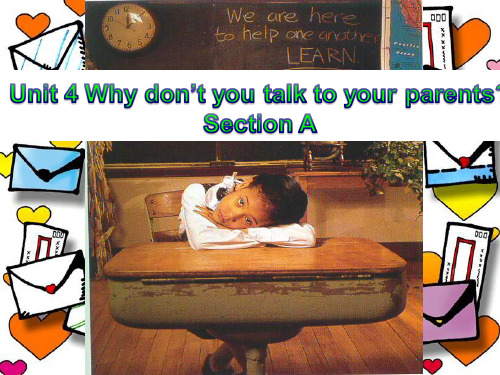
2.有毛病,错误的 4.午夜,子夜 6.猜测,估计 8.重要的事 10.和睦相处,关系良好 12.交流,沟通(n.) 14.云,云朵 16.代替,反而 18.焦虑的,担忧的 20.正确的,恰当的 22.交流,沟通(v.) 24.清楚易懂的,晴朗的 26.归还,回来
1.look through 浏览
He is looking through the books in the library.
look around 四处张望 look up 向上看;查找 look into 调查 look after 照顾;照看 look at 看看 look for 寻找
2 .Although she’s wrong , it’s not a big deal. 尽管她做得不对,但也没什么大不了的。 although 引导让步状语从句 虽然;尽管 big deal 重要的事情或状况 It is not a big deal.= It is no big deal. deal n. 协议;交易 n.大量 a good / great deal (of sth) vi.处理;应对 deal with
3 Hope things work out. 希望事情会好起来。 work out解决(问题)改善(状况)
Do you want to stay with us to see how things work out?
1.用功学习
2.得到足够的睡眠
龙陵县第三中学八年级英语下册Unit4Whydon'tyoutalktoyourparentsRev

7. Reading and writing are two basic learning ___sk__il_ls__ (skill).
8. After she took a short break, she _c_o_n_ti_n_u_e_d_ (continue) climbing the mountain.
即
一、根据句意及汉语提示完成单词。
时 演 1. When we _c_o_m__p_a_r_e_ (比较) western culture
练
with Chinese culture, you’ll find many
differences.
2. After a ___q_u_ic_k___ (迅速的) breakfast, I ran
A. /; a B. the; a C. an; the D. a; the
2. If you want to know more about universe(宇宙),
please _______ the book A Brief History of Time.
A. look through
B. look around
allow sb. to do sth. look through get into/have a fight with … call sb. give back be angry with sb.
7. 重要的事 8. 成功地开展;解决 9. 和睦相处;关系良好 10. 和……沟通 11. 下次 12. 交朋友
5. With the _d_e_v_e_lo_p_m__e_n_t_ (develop) of science and technology, life is becoming much easier.
人教版八下英语第四单元Unit 4知识点归纳
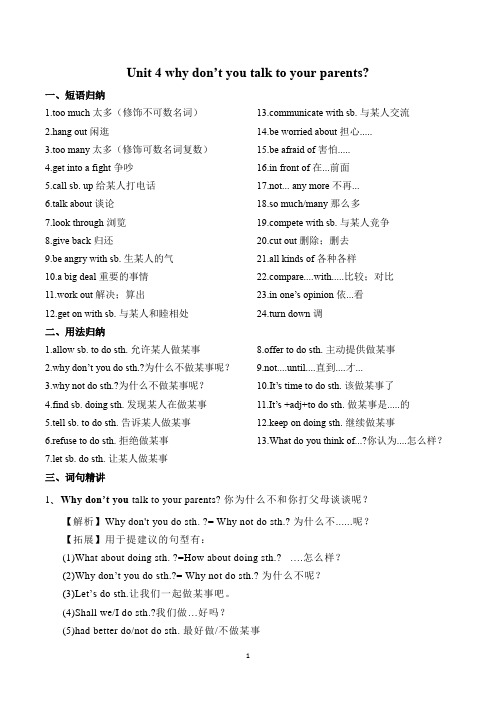
Unit4why don’t you talk to your parents?一、短语归纳1.too much太多(修饰不可数名词)2.hang out闲逛3.too many太多(修饰可数名词复数)4.get into a fight争吵5.call sb.up给某人打电话6.talk about谈论7.look through浏览8.give back归还9.be angry with sb.生某人的气10.a big deal重要的事情11.work out解决;算出12.get on with sb.与某人和睦相处municate with sb.与某人交流14.be worried about担心.....15.be afraid of害怕.....16.in front of在...前面17.not...any more不再...18.so much/many那么多pete with sb.与某人竞争20.cut out删除;删去21.all kinds of各种各样pare....with.....比较;对比23.in one’s opinion依...看24.turn down调二、用法归纳1.allow sb.to do sth.允许某人做某事2.why don’t you do sth.?为什么不做某事呢?3.why not do sth.?为什么不做某事呢?4.find sb.doing sth.发现某人在做某事5.tell sb.to do sth.告诉某人做某事6.refuse to do sth.拒绝做某事7.let sb.do sth.让某人做某事8.offer to do sth.主动提供做某事9.not....until....直到....才...10.It’s time to do sth.该做某事了11.It’s+adj+to do sth.做某事是.....的12.keep on doing sth.继续做某事13.What do you think of...?你认为....怎么样?三、词句精讲1、Why don’t you talk to your parents? 你为什么不和你打父母谈谈呢?【解析】Why don't you do sth. ?= Why not do sth.? 为什么不......呢?【拓展】用于提建议的句型有:(1)What about doing sth. ?=How about doing sth.? ….怎么样?(2)Why don’t you do sth.?= Why not do sth.? 为什么不呢?(3)Let’s do sth.让我们一起做某事吧。
人教版英语八年级下unit4讲解与练习

Unit 4 Why don’t you talk to your parents1.I have to study too much so I don’t get enough sleep.1) 此处so为连词,意为“因此,所以”,引导结果状语从句。
例:He had a bad cold yesterday so he didn’t go to school.中考链接(2012.广东)Ben was busy taking a training class, _____ we had to wait for him for half an hour.A. soB. ifC. orD. But2) 此处sleep 为不可数名词,意为“睡觉,睡眠”例:Do you ever talk in your sleep【拓展】sleep (slept, slept) 也可作不及物动词,意为“睡觉”例:She goes to sleep at nine o’clock every night.2.I have too much homework so I don’t have any free time to do things I like.1)词语辨析Too much:词义____________可修饰_______________举例_______________________________________________Much too:词义____________可修饰_______________举例_______________________________________________Too many:词义____________可修饰_______________举例_______________________________________________2) 此处to do things 为动词不定式作后置定语,修饰名词time.例:Would you like something ___________你想要吃点什么吗3.My parents don’t allow me to hang out with my friends.1) 此处allow作及物动词,意为“允许”Allow sb. to do sth. 允许某人做某事例句:I can’t allow you to talk to Mom like that.【拓展】a. Allow sth. 允许某事b. Allow doing sth. 允许做某事2)此处hang out (hung out) 意为“闲逛,溜达”例:He often hangs out with his friends.4.I’m really tired because I studied until midnight las t night.此处until为介词,意为“直到......为止”,同义词为till.It may last until tomorrow.【拓展】until为连词,意为“直到......为止”,引导时间状语从句。
人教版英语八年级下册Unit4听力原文及翻译
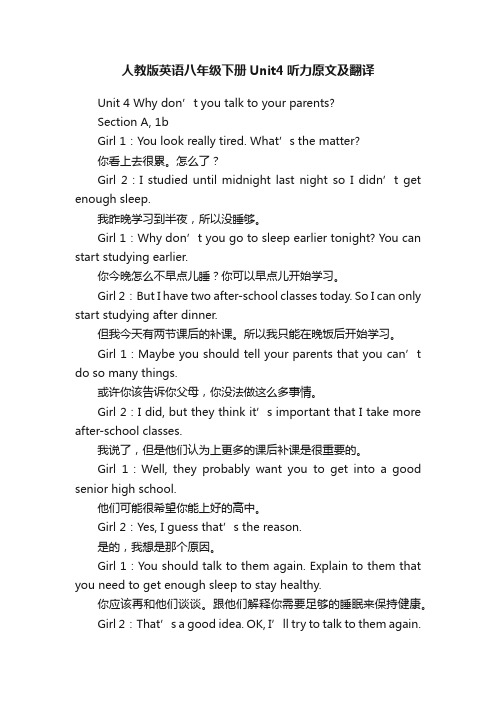
人教版英语八年级下册Unit4听力原文及翻译Unit 4 Why don’t you talk to your parents?Section A, 1bGirl 1:You look really tired. What’s the matter?你看上去很累。
怎么了?Girl 2:I studied until midnight last night so I didn’t get enough sleep.我昨晚学习到半夜,所以没睡够。
Girl 1:Why don’t you go to sleep earlier tonight? You can start studying earlier.你今晚怎么不早点儿睡?你可以早点儿开始学习。
Girl 2:But I have two after-school classes today. So I can only start studying after dinner.但我今天有两节课后的补课。
所以我只能在晚饭后开始学习。
Girl 1:Maybe you should tell your parents that you can’t do so many things.或许你该告诉你父母,你没法做这么多事情。
Girl 2:I did, but they think it’s important that I take more after-school classes.我说了,但是他们认为上更多的课后补课是很重要的。
Girl 1:Well, they probably want you to get into a good senior high school.他们可能很希望你能上好的高中。
Girl 2:Yes, I guess that’s the reason.是的,我想是那个原因。
Girl 1:You should talk to them again. Explain to them that you need to get enough sleep to stay healthy.你应该再和他们谈谈。
英语八年级下册Unit4八下unit4课件

1 Free talk:
1
/ Are you under too much pressure? 4 Please report to class.
sports practice
the fitness gym
language classes
music lessons
tutoring for school subjects
62 0 2 2 /
1 Read the passage quickly and answer the following
1
/ questions. 4 1. Do American and British children do many after-
school activities? 2. Are many children undYeresp,trheessyudroe?.
1
/ After school I usually…
4
play football
have piano lessons
42
0
2
2
/
1 1
barbecue(烧烤)party
/
4
organized freedom complain pushy
pressure compare
52 0 2 2 / 1 1 / 4
2.Pushy parents are nothing new, but now parents seem to push their children a lot more.
3.Their school days are busy enough.
12
70
2
人教版八年级英语下册UNIT 4

Unit4 Why don't you talk to your parents?名词:deal 交易relation 关系communication 交流cloud 云member 成员pressure 压力opinion 意见skill 技巧;能力football 足球development 发展动词:allow 允许guess 猜测argue 争吵offer 提出;给予communicate 交流explain 解释copy 抄袭return 归还complete 竞争continue 持续compare 比较push 推;推动cause 造成形容词:wrong 错误的elder 年级较大的nervous 焦虑的proper 正确的;恰当的clear 清楚的typical 典型的quick 快的crazy 疯狂的usual 通常的副词:instead 代替;反而secondly 第二;其次anymore 再也不perhaps 可能;大概代词:whatever 任何短语:work out 解决get on with 和睦相处cut out 删除compare…with…比较in one's opinion 依某人看知识点:1、My parents don’t allow me to hang out with my friends.Allow作动词,意为:允许;准许allow sb to do sth 允许某人做某事allow doing sth 允许做某事be allowed to do sth. 被允许做某事Please allow me to introduce myself. 请允许我做一下自我介绍。
We don't allow eating in the classroom. 不允许在教室里吃东西。
Passengers are not allowed to smoke in the train.2. I got into a fight with my best friend.我和我最好的朋友吵架了.Get into a fight with sb. 和某人打架/吵架= have a fight with sb. (fight 为名词)= fight with sb. (fight为动词)school.3、What's wrong? =What's the matter?= what’s up?= what’s the trouble? 怎么了?What's wrong with sb ?=What's the matter with sb?某人怎么了What's wrong with Jim?(1)用于询问对方有什么问题或有什么不顺心的事.可翻译为: …怎么了 ; …..出什么事了?(2) 用于医生询问患者的病情. 可翻译为: …怎么了; 哪不舒服.(3) 用于询问某物出了什么毛病或故障.(1)Wrong在此处作形容词,意为:有毛病的The doctor could find nothing wrong with him.医生查不出他有什么病.(2) wrong 作形容词,还可意为: 错误的 ,此时其反义词为right.4、why don’t you go to sleep earlier this evening? Why don't you do sth?常用来向对方提出建议提建议句型:Why don't you do sth?=Why not do sth?你为什么不……?Shall we do sth?我们……好吗?Let's do sth. 让我们……吧。
- 1、下载文档前请自行甄别文档内容的完整性,平台不提供额外的编辑、内容补充、找答案等附加服务。
- 2、"仅部分预览"的文档,不可在线预览部分如存在完整性等问题,可反馈申请退款(可完整预览的文档不适用该条件!)。
- 3、如文档侵犯您的权益,请联系客服反馈,我们会尽快为您处理(人工客服工作时间:9:00-18:30)。
( )1. I think________ you are clever.A . which B. that C. when D. how( )2.I________ he________ go there by himself.A. think;won’tB. don’t think;willC. don’t think;is D .think;isn’t going to ( )3.The teacher told us the moon________ around the earth.A. wentB. goesC. goingD. move( )4.—I’m flying to Beijing for a visit with my parents. —________.A. If you wishB. That’s rightC. Have a good journeyD. Help yourself ( )5.—How can you get to Beijing________ Shanghai?—________ train.A. from;OnB. from;ByC.to;By D .to;On a( )6. He told me that they________ a match yesterday.A. will haveB. haveC. hadD. are having( )7. Yesterday evening my uncle____ me an interesting story when someone knocked at the window.A. was tellingB. told C .was speaking D. was saying( )8. Do you think________ an English film tomorrow night?A. is thereB. there is going to beC. there is going to haveD. will there be ( )9. No one knows________ Miss Wang lives.A. whatB. howC. whenD. where( ) 10.Could you tell me________ I can do it?A. thatB. whatC. howD. how to( )11.She asked she could copy my homework.A. ifB. whatC. whoD. whose( )12.I asked her how going to become a computer programmer.A. were youB. you wereC. are youD. you are( )13. Lisa was supposed her homework before nine o'clock. But she couldn't.A. to finishB. to finishingC. finishD. finishing( )14. --Must I stay here until one o'clock.--No, you .A. can'tB. needn'tC. mustn'tD. may not( )15. I have to tell you.A. nothing new elseB. else new nothingC. else nothingD. nothing else new( ) 16. I found a letter _______ on the floor when I came into the classroom.A. lyingB. layC. lieD. lies( )17. Let’s go hiking ________ staying at home, shall we?A. insteadB. in order toC. instead ofD. so that( ) 18. ---Sorry, Mr. Green. I have _____ my homework at home.---Never mind. But don’t forget next time.A. putB. kept C left D remained.( ) 19. Why are you so tired these days.? --- Well, I have_____ homework to doA. too much B too many C. much too D. many too( )20. My sister is outgoing. she likes making friends with _____.A. otherB. anotherC. the otherD. others( )21. There is a ruler in his left hand, what is in her ______ hand?A. the otherB. otherC. othersD. another( )22. My family has two dogs. One is white, _________ is black.A. otherB. anotherC. the otherD. others( )23. The boy is always ____ me a hand whenever I am in trouble.A. giveB. givingC. to giveD. gave( )24. If you want to know more information about the party. Please ____ the website: www. .A. set upB. look throughC. pick outD. turn off( ) 25. _____ he was very tired, he continued working in his office.A. SinceB. AlthoughC. As soon asD. Because( )26, I hear the company _____ him a very good job, but he turned it down.A. donatedB. servedC. offeredD. introduced( ) 27. My mother prefers to take a bus to her office ____ she has a car of her own.A. ifB. becauseC. althoughD. until( ) 28. I borrowed a pen from Mary yesterday. But I’ve lost it. You ______ say sorry to her.A. willB. shouldC. couldD. may( )29. I used to quarrel a lot with my parents, but now we ______ just fine together.A. get alongB. get upC. get away D get off( )30. When did your mother ___ Shanghai?A. return B, return back C. return to D. return back to( )31.---Do you want an apple or a pear? - ____. I really don’t mindA, Both B. None C. Neither D. Either( )32. .To our___, Mr. Wang didn’t come to the meeting.A. surpriseB. surprisedC. surprisingD. surprises( )33..Our new teacher is very easy to ____A, get on B, get on with C. get together D. get over( )34Could you give your partner a ticket to a ball? Yes,___A I would B.I do C, I can D. I would( )35.I’m very upset and don’t know___/.A. how to do B, what to do it C, what to do D. what doing( )36.The teacher didn’t begin the class__ all the students___.A. until, stopped to talk B, before, stopped talking C, while, stopped to talk( )37.She didn’t know what to do. So she__ her friend __ advice.A, took, a piece of B. gave, a piece of C. asked, for D, come to, fo( )38.Life__ Cathy and her three children __ very busy.A for, is B, to, is C, of, are D, for, are( )39..I am interested in animals, so I __ lots of time playing with my dog.A. payB. take C, spend D, cost.( )40 .Our teacher often asks me__ English as __ as I can.A. to speak, many B .not to speak, many C. to speak, much D. not to speak much( )41.The teacher speaks loudly so that the students can hear her ______.A. slowlyB.clearlyC. quietlyD. carefully( ) 42. Do you often go swimming ____ Sunday mornings? Yes, Why not ____ with me this Sunday.A. on, goB. in, to goC. on, goingD. in , going( )43. You’d better take the map with you_______ you won’t get lost.A. as long asB. as soon asC.now thatD. so that( )44. What do you think of my composition? (作文)-- You should ___ the last two sentences(句子)A. cut upB. cut outC. turn downD. turn into( ) 45. She never ______ herself _____ others.A. complains....aboutB. compares, toC. complains, toD. compares, with( )46. I think drinking milk every morning is good ______ our health. ---Yes, I agree _____you.A. to, toB. with , toC. at , with D for, with( )47. The tired man get home 8pm every dayA. didn’t, untilB. didn’t, at C, doesn’t, until D. doesn’t . at( )48. How about ____ calendar?A buy B. to buy C. buying D. bought( )49. I believe that singing English songs help me ____ my English.A. improveB. improvedC. improvingD. to improving( ) 50.----In our English study, reading is more important than speaking, I think.----I don’t agree. Speaking is ____ reading.A. as important asB. the most importantC. the sameD. more important( )51.This box is ____ heavy ____ I can’t carry it.A.too, toB. so, thatC. such, that, D enough ,to。
